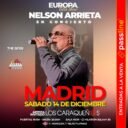Entrevista y traducción: Rafael Ayala Paez
(Kentucky, Estados Unidos). Poeta y fotógrafo. Ha publicado los chapbooks: Prominences and Sinking of the Cloth (Flutter Press); Set Apart Before the World Was Made (Calliope Nerve Media); The Feathered Masks and Burnt Palmistry (Full of Crow); Handing the Cask (erbacce press); Fragments of Calendars (Thunderclap Press); y White Vases (Crisis Chronicles Press).
Su trabajo ha recibido nominaciones para el Pushcart Prize, Best of the Net y Best of the Web.
Rafael Ayala Páez: ¿Qué es la poesía para John Swain?
John Swain: La poesía es la libertad y la comunión. Autodefinición y transformación, y en última instancia, una abnegación. Siempre una búsqueda, un viaje. La realización simultánea de la interrelación entre lo pequeño, lo aparentemente mundano y la vasta riqueza hermosa y misteriosa que contiene. Los versos de William Blake «Para ver el mundo en un grano de arena/ Y el Cielo en una flor silvestre/ Abarca el infinito en la palma de tu mano/ Y la eternidad en una hora», ilustran para mí el objetivo y el efecto de la poesía. Parrafeando a Allen Ginsberg, he visto surgir a la poesía en aquellos momentos cuando las alegrías y las penas se sienten tan hondamente que se entrelazan y tienen el mismo sabor.
RAP: Desde tu punto de vista: ¿Qué puede reflejar el poema?
JS: Ciertos modos de pensamiento y de sentimiento -interacciones invisibles formadas por el idioma a través de la declaración, el interrogatorio y la imagen. Asombro. La reunión de la imaginación y el mundo, dentro y fuera del poema. La idea clásica del fuego interno de los ojos que interactúan recíprocamente con el fuego externo de la luz sugerido por un sentido animado y comprometido de la percepción con la acción poética. Creo firmemente en la realidad inmediata y trascendente de lo imaginado en el momento que es escrita o pronunciada. Sin embargo, esa realidad es extremadamente frágil y el exilio, seguro. El poema es una magia peligrosa.
RAP: ¿Cuáles son tus poetas preferidos?
JS: Tres poetas contemporáneos de sorprendente originalidad y visión: Lynn Alexander, Youssef Alaoui-Fdili y Bree.
RAP: ¿Cómo ves la poesía estadounidense actual?
JS: No estoy ni capacitado ni especialmente inclinado a ofrecer una opinión sobre el estado de la poesía estadounidense. Me atrevería a decir que la forma en que se perciba la poesía estadounidense actual dependerá de las intenciones y ambiciones de cada uno. Lo que significa que los caminos están abiertos, y, creo que la apertura tecnológica ayuda a los poetas a encontrar audiencias fuera de los círculos académicos. Dicho esto, caminos diversos requieren sacrificios diversos. Pienso, además, que la poesía y las artes en general nos ofrecen, sino un pequeño antídoto, entonces, una alternativa a algunos de los elementos más tóxicos en la cultura americana.
RAP: ¿Puedes hablarme un poco sobre tu nuevo libro de poemas White Vases (Crisis Chronicles Press, 2012)?
JS: White Vases es un pequeño libro de poemas diáfanos que tiene de portada una preciosa fotografía provista por el gran artista de Cleveland: Steven B. Smith. Los poemas mezclan sueño y acción en cierto modo como un registro de dónde estaba y qué estaba sintiendo y experimentando en aquel momento.
Estoy sumamente honrado y complacido por la manera en que algunas personas han respondido al libro. Sin embargo, el pensamiento que me deja White Vases es agridulce, porque gran parte de la alegría que rodeó el nacimiento de ese libro, a diferencia de los poemas individuales dentro de él, ha quedado fuera de mi vida. Dicho esto, creo que los poemas se ponen de pie por su cuenta y continúan abriendo nuevos significados. Me siento orgulloso de eso.
RAP: Eres un gran lector de Pablo Neruda y Federico García Lorca. ¿De qué manera estos poetas han influido en tu propia poesía?
JS: Neruda y Lorca son gigantes que han influido en toda la poesía. Pasión y amorosa conexión a su tierra y a sus semejantes. Neruda abrió las posibilidades visionarias y sensuales de la vida cotidiana de una manera directa, y con un elegante y a veces enigmático lenguaje. Lorca, por su parte, encontró la música salvaje y apasionada en cosas que destacó con una gran conciencia de las penas de la soledad y la muerte.
RAP: Has dicho que la escritura de un poema es «as a constant struggle toward receptivity of perception». ¿Todavía mantienes esta idea?
JS: Mis pensamientos sobre la naturaleza y la teoría de la poesía a menudo son pasajeros, lo cual es apropiado porque tales teorías son finalmente irrelevantes ante el propio poema. El laberinto y la confesión del poema junto con la interacción del lector es todo lo que realmente importa. El resto es un ejercicio interesante que puede ayudar a entrar al poema, pero no hace, pienso, hablar a la experiencia esencial que se busca en la escritura o lectura. Por ejemplo, no comienzo un poema en respuesta a una teoría de escritura. Comienzo un poema tras una experiencia abrumadoramente maravillosa que brota de cualquier cosa, desde un pájaro, una cuchara, el toque de una amante, lo que sea.
Tal vez las teorías son formativas desde una perspectiva general o como una justificación a posteriori. La receptividad es crucial para el acto poético, pero el poeta no es una vasija vacía. El poeta logra receptividad a través de una disciplinada y activa participación de la conciencia y las energías alrededor de él.
RAP: Finalmente, ¿en qué proyectos actuales estás trabajando?
JS: Crisis Chronicles ha consentido generosamente en imprimir una continuación de White Vases este verano titulada Rain and Gravestones. Asimismo, la nueva prensa, Kleft Jaw, publicará un chapbook mío a finales de este año.
***
Rafael Ayala Páez: What is poetry for John Swain?
John Swain: Poetry is freedom and communion. Self-definition and transformation and ultimately an abnegation. Always a searching, a journey. A simultaneous realization of the interplay between the small, the seeming mundane and the vast beautiful richness and mysteries contained therein. William Blake’s lines “To See a World in a Grain of Sand/ And Heaven in a Wild Flower,/ Hold Infinity in the palm of your hand/ And Eternity in an hour”, illustrates to me the aim and effect of poetry. Also to paraphrase Allen Ginsberg, I have found poetry to arise at those moments when joys and sorrows are felt so deeply that they intermingle and become the same taste.
RAP: From your point of view: what may reflect the poem?
JS: Certain manners of thought and feeling -unseen interactions shaped by language through declaration, questioning, and image. Wonderment. The meeting of imagination and the worlds within and outside of it. The classical idea of the internal fire of the eyes interacting with the external fire of light suggested an animated and engaged sense of perceiving that informs the poetic action. I steadfastly believe in the immediate and transcendent reality of the imagined at the moment the word is written or uttered. However, that reality is exceedingly fragile and exile is certain. The poem is a dangerous magic.
RAP: Who are your favorite poets?
JS: Three contemporary poets of startling originality and vision are Lynn Alexander, Youssef Alaoui-Fdili, and Bree.
RAP: How do you see the current American poetry?
JS: I am neither qualified nor particularly inclined to offer an opinion on the state of American poetry. I would say that how one perceives current American poetry would depend on one’s intentions and ambitions. Meaning that the pathways are fairly open and I believe technology aids in that openness by finding audiences for poets outside of academic and other communities. That said, different paths require different sacrifices. Despite all that, I think that poetry and the arts in general offer, if not a minor antidote, then, an alternative to some of the more toxic elements in American culture.
RAP: Would you talk a little about your new book of poems White Vases (Crisis Chronicles Press 2012)?
JS: White Vases is a little book of quiet poems with a beautiful cover photograph provided by the great Cleveland artist, Steven B. Smith. The poems blend dream and action in some small way as a record of where I was and what I was feeling and experiencing at the time. I have been extremely honored and gratified by the way some people have responded to the book. However, thinking of White Vases is bittersweet because so much of the joy that surrounded the birth of that book, as opposed to the individual poems within it, has passed from my life. That said, I think that the poems stand up on their own and continue to open new meanings. I am proud of that.
RAP: You are a great reader of Pablo Neruda and Federico García Lorca. In what way these poets have influenced your own poetry?
JS: These men are giants who have influenced all poetry. Passion, possibility, and loving connection to earth and fellow men. Neruda opened the visionary and sensual possibilities of the everyday in a direct, elegant, probing, and at times enigmatic language. Lorca found the wild and passionate music in things underscored by an awareness of the sorrows of solitude and death.
RAP: You said to write a poem is «as a constant struggle toward receptivity of perception». Are you still keeping this idea?
JS: My thoughts on the nature and theory of poetry are often fleeting, which is appropriate because such theories are ultimately irrelevant in the face of the poem itself. The labyrinth and confession of the poem along with the interaction of the reader is all that really matters. The rest is an interesting exercise that may assist one in entrance to the poem, but does not, I think, speak to the essential experience that is sought in writing or reading. For instance, I do not begin a poem in response to a theory of writing. I begin a poem following an overwhelming experience of wonder arising from anything from a bird, a spoon, a lover’s touch, anything. Theories are perhaps formative in the sense of a general perspective or a justification after the fact. Receptivity is crucial to the poetic act, but the poet is not an empty vessel. The poet attains receptivity through a disciplined and active engagement to consciousness and the energies surrounding him.
RAP: Finally, what projects are you working on today?
JS: Crisis Chronicles has generously agreed to print a follow-up to White Vases this summer called Rain and Gravestones. Also, the new press, Kleft Jaw, will be producing a chapbook for me later this year.






